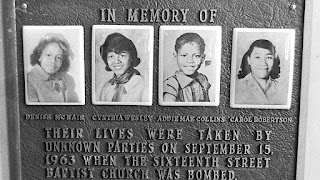I've seen this photo numerous times, but the date always grabs me: September 15, 1963 would have been my mother's 38th birthday. I would have been a budding toddler with Linus blanket and binky, a year an a month old. On this day in 1962, John Glenn would become the first American astronaut to orbit the Earth, thanks largely to African American female "computers," truly "Hidden Figures," since it would be decades before their courageous stories would be told.
In October of 1962, when I was two months old, we skated on the precipice of Armageddon with the Cuban Missile Crisis, when (ahem) Communists and Russians were considered the "bad hombres."
Two months later in 1963, President Kennedy would be assassinated in Dallas, Texas.
I understand why my mother said these were the years... she prayed a lot.
There will never be an acceptable explanation for what happened between Michael Brown and Darren Wilson in Ferguson but we will never fully grasp why the stage was set for such an encounter unless we know American history.
We cannot fully comprehend why Dylan Roof murdered nine parishioners at Emanuel AME Church in Charleston unless we study the Civil War and the Confederacy.
We cannot truly fathom how a minor traffic stop in Cincinnati could result in a white campus police officer blowing out the brains of an unarmed black man unless we delve into the role race has played in law enforcement from the enactment of the federal Fugitive Slave Act in 1850 to today's mandatory minimum sentencing statutes.
Examining American history provides us with the tools to analyse how the death of Michael Brown and the demonstrations on Florrisant Avenue became a tipping point and sparked a movement. Connecting the dots between the past and the present helps us to see the origins of our current national debate - about race, police misconduct, white supremacy, white privilege, inequality, incarceration and the unfinished equal rights agenda.
The Pendulum
The history of people of African descent in America - which is to say the history of America - is a pendulum of progress and setbacks, of resilience and retaliation, of protest and backlash. There have been allies and there have been opponents. There have been demagogues, who would divide Americans on the basis of colour and class, and visionaries who would seek to lead us to common ground.
The quest for "life, liberty and the pursuit of happiness" has been an American aspiration since the Declaration of Independence, but black Americans, Native Americans and women were not at the table in 1776. Forty of the 56 signers owned other people.
Lest there be any doubt about where the young nation's sentiments lay, the Supreme Court's 1857 Dred Scott decision made clear that people of African descent - whether enslaved or free - would not be considered American citizens and had no legal standing in the courts. It mattered not that some of their grandfathers had served in George Washington's Continental Army during the Revolutionary War.
Al Jazeera: Know your history: Understanding Racism in the US, A'Lelia Bundles
Comments